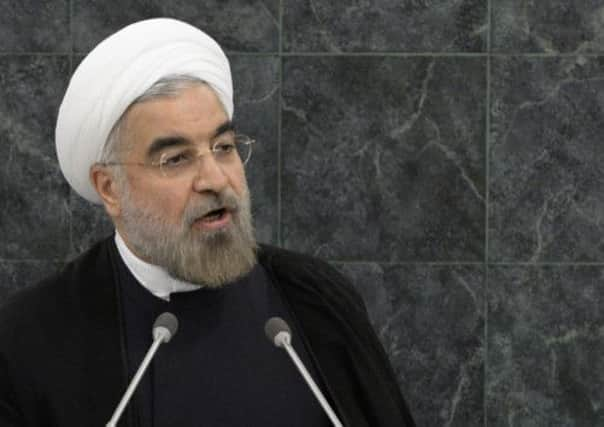Iran seizes moral high ground before US talks


President Hassan Rouhani – who holds a doctorate degree from Glasgow’s Caledonian University – addressed a United Nations forum on nuclear disarmament, speaking as chairman of an organisation of mostly developing countries that has long demanded that Israel sign the 1979 Non-Proliferation Treaty.
His comments came hours before a meeting of world powers on Iran that aims to pave the way for the first round of substantive negotiations on Tehran’s nuclear programme since April.
Advertisement
Hide AdAdvertisement
Hide AdThe meeting, on the sidelines of the annual General Assembly in New York, was set to mark the highest-level direct contact between the United States and Iran in six years.
The talks also will test the Islamic Republic’s apparent willingness to reach a deal to resolve international concerns over its nuclear ambitions, after years of defiance.
Iran insists its nuclear programme is for peaceful purposes only, and has said it needs to enrich uranium to produce reactor fuel and for medical purposes. But world powers fear Iran is enriching uranium to build warheads, and have imposed strict sanctions to punish Tehran for failing to halt its nuclear research.
Mr Rouhani, speaking yesterday morning for the Non-Aligned Movement, said all nations should be subject to International Atomic Energy Agency inspections and other nuclear safeguards. Increased transparency, including more inspections, is a key part of the negotiations over Iran’s nuclear programme.
“No nation should possess nuclear weapons, since there are no right hands for these wrong weapons,” he said.
He added: “Almost four decades of international efforts to establish a nuclear weapon-free zone in the Middle East have regrettably failed.” He noted that Israel is the only state in the region that has not embraced the Non-Proliferation Treaty.
A spokeswoman for the Israeli mission at the UN did not have an immediate comment. Since his June election, Mr Rouhani has made clear he is seeking relief from international sanctions and has welcomed a new start in nuclear negotiations in hopes they could ease the economic pressure.
He has said he enjoys the full support of Iranian supreme leader Ayatollah Ali Khamenei, who has the final word on all important matters of state in Iran, including the nuclear question. Encouraged by signs that Mr Rouhani will adopt a more moderate stance than his hard-line predecessor, Mahmoud Ahmadinejad, but sceptical that the country’s supreme leader will allow a change in course, president Barack Obama has directed Secretary of State John Kerry to lead a new outreach to explore possibilities for resolving the long-standing dispute.
Advertisement
Hide AdAdvertisement
Hide AdHowever, Mr Obama and other US officials have said Iran must prove its commitment with actions, not just words.
Nonetheless, Mr Kerry has sought to bolster international support to keep pressure on Iran in nuclear talks with world powers.
Iranian foreign minister Mohammad Javad Zarif was due to meet Mr Kerry as well as diplomats from Britain, France, Russia, China and Germany last night at a session aimed at jump-starting efforts to resolve a decade-long standoff over Iran’s nuclear ambitions.
Mr Zarif has been commissioned by Mr Rouhani to take part in talks aimed at breaking the deadlock with western powers over sanctions.
Ahead of the high-level talks, Mr Kerry said he looked forward to a “good meeting” but would not specify what Iran should do to show a genuine desire to address concerns about its plans.
Just hours before the start of the talks on the sidelines of the General Assembly, Mr Kerry secured agreement from his Chinese counterpart calling for Iran to respond to existing nuclear proposals by the six world powers, American officials said.